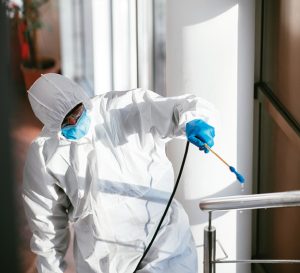 According to David Cain, MD of Bed Bugs Ltd, as well as having a negative impact on public health, an infestation of bed bugs can be a huge problem for FMs in a range of sites, from hotels to offices. Here is his guide to beating the bugs
According to David Cain, MD of Bed Bugs Ltd, as well as having a negative impact on public health, an infestation of bed bugs can be a huge problem for FMs in a range of sites, from hotels to offices. Here is his guide to beating the bugs
You may have seen recent news stories about the plague of bed bugs and, if you are in the hospitality or facilities sector, been thoroughly alarmed by what has been made to sound like an unstoppable menace.
It is certainly true that a bed bug infestation can cause substantial harm to any hotel, both regarding the expense of eradicating the pests and making good any damage to the interior décor and soft furnishings and the impact of complaints and negative reviews – or indeed lawsuits – that may follow from customers who have suffered the consequences of contact with bed bugs.
As always, prevention is the more desirable option than reacting to an infestation which has become established, but preventing a single bug from crossing the threshold of a hotel or business would be an extremely challenging task.
Few guests or staff would, for instance, agree to being strip-searched or having their belongings fumigated on arrival, even if they are aware that bed bugs often arrive on visitors’ clothing or luggage.
It’s probably fair to say that you will not be able to deter every single bed bug from making its way into your business, but good hygiene procedures and thorough staff training will go a long way towards preventing the intrusion of one or two bugs becoming a full-blown and profoundly damaging infestation.
Early detection of bed bugs is the best way to prevent a small problem from becoming a much bigger one. This is why regular inspections are crucial.
Monitoring devices are often helpful in alerting staff to the presence of bugs, but some of these are more discreet than others: monitors which are obvious to visitors may give the impression that the business suffers frequent bed bug issues or at least plant the unwelcome idea of bed bugs in their minds. However, if you wait till the first complaint from a visitor – or the first alert from a member of staff, the problem will have become established. Some people transmit bed bugs and show no signs themselves, acting like Typhoid Mary and wreaking havoc.
In 2016, having proved our approach to the academic community, I wrote the first chapter on managing bed bugs in hotels published in Advanced in the Biology and Management of the Modern Bed Bugs (Wiley Press) .
If a bed bug problem is caught early, dealing with the bugs can be done swiftly, and it may be possible to avoid closing rooms to guests for any length of time. It is not good for hotels to have any rooms out of commission, but if there is a serious issue, it must be dealt with thoroughly and fast.
A partial eradication of the bugs will rapidly repopulate leading to further problems in the future. If you’re not working at 100 per cent efficiency or they ingress into the fabric of the building, only a full refit will resolve the problem.
BED BUG PREVENTION
It is, therefore, best practice for any hotel or business where people sit to have robust bed bug policies even if, so far, there have been no reports of bed bug activity on the premises.
The first step would be a thorough inspection of the entire building to ensure that no bugs are present or, should some have gained entry, that they are eliminated before they can reproduce in quantity.
Subsequently, staff should be trained to spot indicators of bug activity. Those who deal with cleaning, laundry and resetting the rooms should be given full training in this area.
Bed Bugs Limited offers a passive monitor technology which is unobtrusive, can be checked by staff on a weekly basis and will indicate the presence of even a few bugs at an early enough stage for eradication to be done by those staff who have been trained in the correct methods.
A mild infestation, effectively treated, should not become a severe infestation, and modern treatments done swiftly enough can return a room to service without too much inconvenience.
The reward for diligence is lower guest and staff complaints which rapidly translates to higher operation efficiency.
Bed bugs may evolve and adapt as they are resilient as a species… but the technology and expertise to deal with them is also adapting and evolving.





